

“The mystery of life isn’t a problem to solve, but a reality to experience. A process that cannot be understood by stopping it.”
I tried to downplay my excitement when Denis Villeneuve publicly stated that adapting Dune was a longstanding dream. After decades of misfires and aborted attempts from the likes of Jodorowsky and Lynch, Villeneuve seemed like the perfect candidate to translate Frank Herbert’s epic sci-fi novel to the screen. In my opinion, he is perhaps the only director working today with the capability of doing it justice. I find him an ideal match for Herbert’s work because he is an extremely competent director of large scale action films—typically surrounding himself with a solid crew that crafts a stunning, unified production aesthetic—but one who expresses himself with a contemplative, brooding, yet subtle personal style that is adaptable to the material at hand. This has allowed him to genre-hop without any significant hiccups and his recent work in blockbuster sci-fi has solidified his reputation as one of the best in the game. To put it simply, I trust him to produce an invigorating adventure film that taps into the essence of the source material without crowding out the thematic riches of Herbert’s text with extravagant visions of his own. He’s more selfless than the two visionary directors who tried their hand before him, but more talented and ambitious (and working with a larger budget) than the showrunners of the Sci Fi Channel (now d/b/a SyFy) miniseries.1
After watching Dune: Part One for the first time, I am happy to report that my trust in Villeneuve was justified. A nearly perfect cast, gorgeous locations, imaginative architecture, a tasteful blend of gritty CGI with physical effects, creative sound design, exciting choreography—each department is firing on all cylinders as they faithfully translate Herbert’s classic work. With a few notable but ultimately benign exceptions, the story remains true to the book, centering on the young Paul Atreides (Timothée Chalamet), a curious young man troubled by visions who might be destined to fulfill an ancient prophecy. His father, Leto (Oscar Isaac), the head of House Atreides, has been assigned by the Emperor as steward of Arrakis, a harsh desert planet with a priceless export known as spice. Leaving the water-rich Caladan, Paul briefly settles into his new life along with a number of other transplants including his mother Jessica (Rebecca Ferguson, the MVP among the cast), a member of the Bene Gesserit sisterhood, weapons master Gurney Halleck (Josh Brolin), mentor and master swordsman Duncan Idaho (Jason Momoa), Mentat Thufir Hawat (Stephen McKinley Henderson), and Suk doctor Wellington Yueh (Chang Chen). The screenplay rapidly introduces a number of threads and factions and creatively conveys a sufficient amount of background info to contextualize the conflict, efficiently fleshing out Herbert’s sprawling universe in breathtaking fashion.
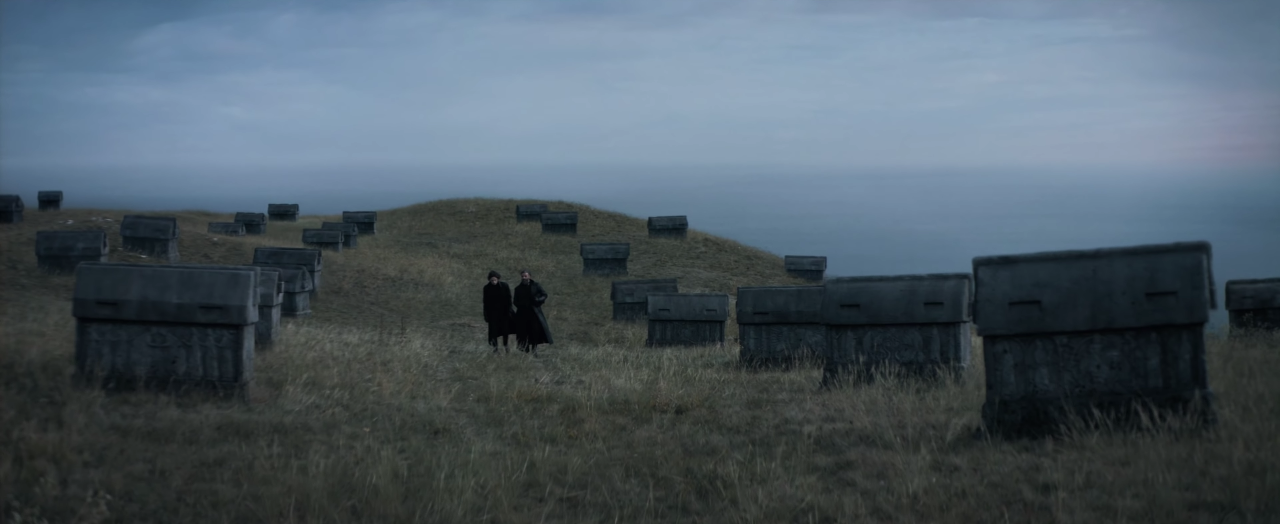
No sooner have Leto and his family taken over Arrakis from the bloated, levitating mass of flesh known as the Baron Vladimir Harkonnen (Stellan Skarsgård) than a diabolical coup is revealed. With secret approval from the Emperor, the Baron arranges for his forces, augmented by the ruthless Sardaukar troops, to retake the planet and wipe out the Atreides bloodline. The terrifying assault is partially successful, rendered in a refreshingly brutal fashion that fills us with dread and genuine fear for the characters’ lives instead of the usual light-hearted battles prominent in other space operas. Miraculously, or maybe by the hand of fate, Paul and his mother survive. Guided by planetary ecologist Liet-Kynes (Sharon Duncan-Brewster), they flee into the desert where a sprawling population of native Fremen thrive beneath the surface unbeknownst to the overlords that exploit their planet for economic gain. While scrambling around in the desert and trying to avoid the enormous sandworms that prowl its expanse, Paul and Jessica reunite with Stilgar (Javier Bardem), a Fremen leader who had briefly represented his people to Leto, and meet Chani (Zendaya), the girl that Paul has been dreaming of for some time. It is worth noting in passing that Stilgar is the most book-accurate character. From writing to performance, his translation from book to screen is flawless, perfectly capturing the character’s taciturn ambivalence and ruthless decision-making in only a few scenes.
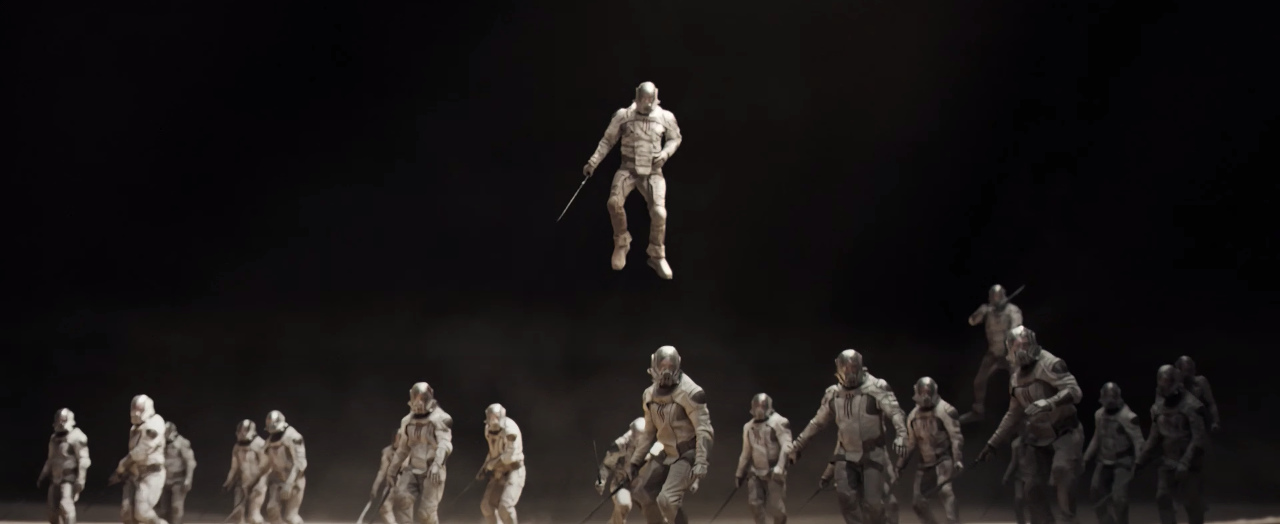
I have scant few complaints about the portions of the book that hit the cutting room floor. All of the most iconic scenes are more or less intact—Leto spotting a sandworm from his thopter and risking his life to save his men; Paul’s terrifying encounter with the Reverend Mother Gaius Helen Mohiam (Charlotte Rampling) and the gom jabbar; Paul and Jessica’s use of sign language and Voice to take down the guards who hold them captive; the induction-by-combat that serves as the film’s finale. In brief appearances, the sandworms inspire the correct amounts of awe and fear. There is one notable character absence, namely Feyd-Rautha, whose introduction I have to assume was punted to the second film to allow adequate space in the first one for everything else. He doesn’t appear to have been combined with his brother, Beast Rabban (Dave Bautista), and his presence is most crucial if Villeneuve intends to remain true to the book. Indeed, as a foil for Paul, his presence would be most welcome. A few threads have to be wrapped up in brief sequences that condense a chapter of the book into a thirty second summary, leaving the viewer to beg that each shot last just a skosh longer, so that we may linger in these invigorating moments. But even as exposition and character development often seem severely truncated, the economy of storytelling is quite impressive, frequently relying solely on visuals, music, and juxtaposition to convey large portions of the background narrative. A great example of this is a quite moment where Paul dips his hand into running water on his home world just before leaving for the arid lands of Arrakis. In any case, the wide-ranging, efficient screenplay is quite impressive and feels much shorter than its 2.5 hours.
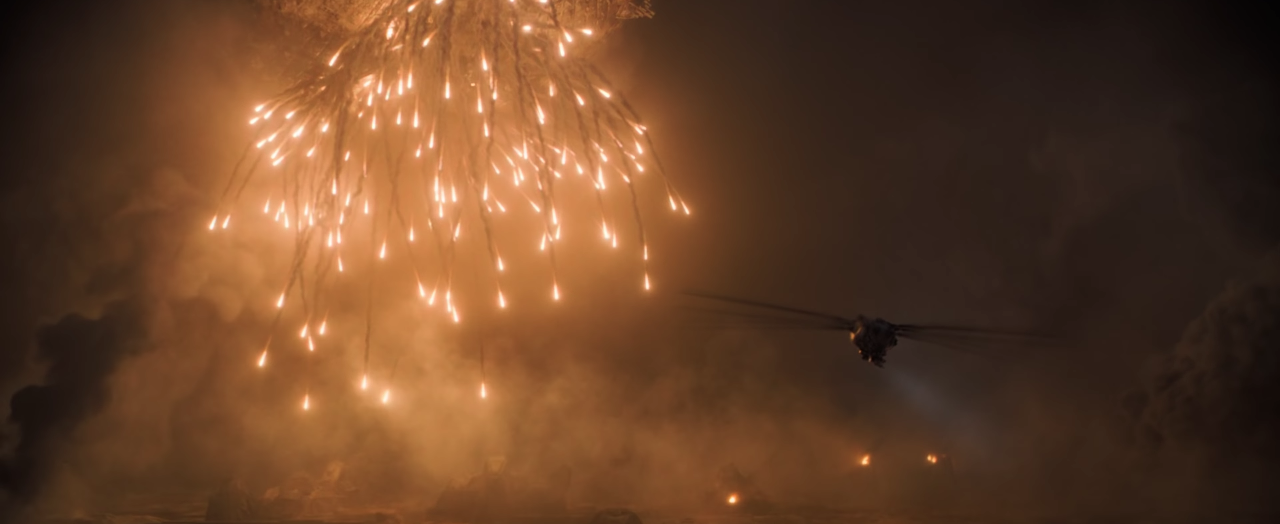
I realize it’s just the nature of this particular beast, but it’s still hard to see some of the grit found in Herbert’s expansive backstory given cursory treatment to make way for more palatable storylines and action sequences, no matter how utterly superb Villeneuve’s blend of practical and visual effects. Most of the philosophical topics undergirding the story are at least presented in nascent form which hopefully indicates that once a fanbase is generated the sequels will go deeper. Realistically though, Herbert’s series—veritable tomes of intergalactic sci-fi pulp woven together with a brainy stoner’s ideas of philosophy, ecology, religion and politics—cannot be transferred to the screen verbatim. That’s simply the reality of adaptation. That Villeneuve has selected the adventure story at the expense of emotional and philosophical depth should hardly be surprising or disappointing. And yet, we can hope that those elements will not be entirely dismissed moving forward.
In other areas I think legitimate complaints can be lodged, though they don’t significantly detract from my enjoyment. Liet-Kynes is given prominence over vastly more important characters like the Baron, Stilgar, Dr. Yueh, Thufir Hawat, simply because she was gender-and race-swapped from a white man to a black woman. I guess if a mostly harmless concession means a few millions more and increases the chances of a part two…? And of course Liet-Kynes is important, though her role in expanding Paul’s understanding of Arrakis is mercilessly streamlined just like the others. Likewise, Chani is a major figure in the movie despite barely featuring in the first half of the book. This seems like a symptom of the halved nature of the story, which requires Villeneuve to point toward what is to come while maintaining a standalone feel, along with Zendaya’s celebrity. There’s also a contrived scene where Paul speaks Mandarin, likely included because Legendary is a China-owned company. One solid use of humor where Duncan teases Paul about his lack of muscle is countered by a failed attempt when Stilgar’s gift of moisture is taken as an offensive gesture; but there’s a refreshing dearth of the meme humor often found in similar projects geared toward mass appeal. There are several small moments of dialogue that didn’t make the cut that might have helped to contextualize Dr. Yueh’s treacherous actions, Thufir’s willful resignation after the assassination attempt on Paul, and the prohibition on computational technology. On an aesthetic front, one might hope for a little less washout, a bit more of the joyful color suggested by the books’ various covers over the years. A frantic sequence featuring a worm up close and personal is disappointingly dim. But all of these are exceedingly minor complaints that really fall by the wayside when considering the film as a whole (or a half…).

Because Herbert’s novel is so near and dear, and Villeneuve such a favorite of mine, I find myself a bit more scrutinizing than I would be otherwise. Initially, I selfishly wished that Roger Deakins had been invited back for another collaboration, having worked on Villeneuve’s last three films. However, Greig Fraser proves more than equal to the task, providing a steady presence behind the camera and conjuring numerous breathtaking moments out of thin air. On the other hand, the absence of the late composer Jóhann Jóhannsson (who scored Sicario and Arrival) is noticeable. Now, Hans Zimmer is no slouch. He worked with the director on Blade Runner 2049 and even seems to take inspiration from Jóhannsson with a vocalized portion of the score, and he also creatively employs bagpipes for a fleeting moment. But several of his other themes are less inspiring and seem to be repetitions of his previous work. In any case, perhaps selfishly, I miss the Icelandic musicians’ ethereal compositions and think they would have been a perfect fit with the material. Even so, without these frequent collaborators, Villeneuve proves that his compelling style is indeed his own. From the hair-raising whispers of the Bene Gesserit voice; to the use of fog effects that obscure the Bene Gesserit’s ship, the naked body of the obese Baron, and a conversation between Paul and Jessica after Paul passes the Revered Mother’s test; to the mystifying juxtaposition of images in Paul’s visions; to the staged moments of iconic visual splendor; to artful touches like the Sardaukar’s Mongolian throat-singing (a small but perfectly fitting addition to the source material that proves Villeneuve has a deep understanding of the book)—it’s clear that he’s in total control of his craft.
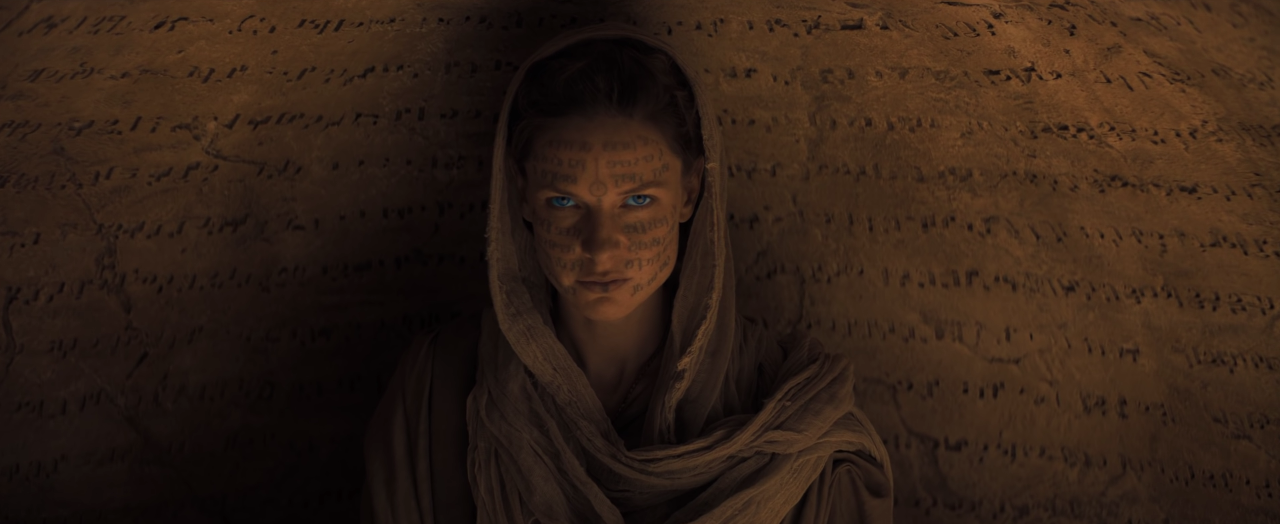
While I emphatically trusted Villeneuve to create an engrossing picture of appropriate scale, I’m much less trustful of bigwig studio heads who dream not of inspiring heroes’ journeys or artistic fulfillment or merit, but of dollar signs. A faithful adaptation of Dune necessarily requires that those conniving studio execs greenlight and fund the expansive production—a harsh reality that forced me to immediately temper my sky-high expectations. Surely when Legendary decided to fork over $165M they conveyed certain requirements of their own, requirements that the director would be likely to accept so as to continue on with his dream project. Early on, it was announced that the film would not cover the entirety of the novel. Perhaps this was an inevitability as studios don’t typically greenlight expensive five hour films2 and cramming everything from the book into a single feature length film would be borderline criminal. But then it was announced that the sequel (as in, the adaptation of the second half of the first book) would not be commissioned until the box office results of the first film justified it.3 This is basically unconscionable, a reckless decision that slightly compromises the first film by forcing it to function as both a standalone blockbuster that could generate sufficient profits to prompt a sequel, as well as the first half of a two-parter. It already has the difficult task of pleasing both hardcore fans of the novels—who’ve never seen a great adaptation of the beloved classic—and unfamiliar moviegoers who are just looking for another franchise to follow for the next decade or so. Why add to the burden? My concerns were further compounded by a lengthy delay due to COVID and Warner Bros. decision to put it on their streaming service at the same time it hit theaters.
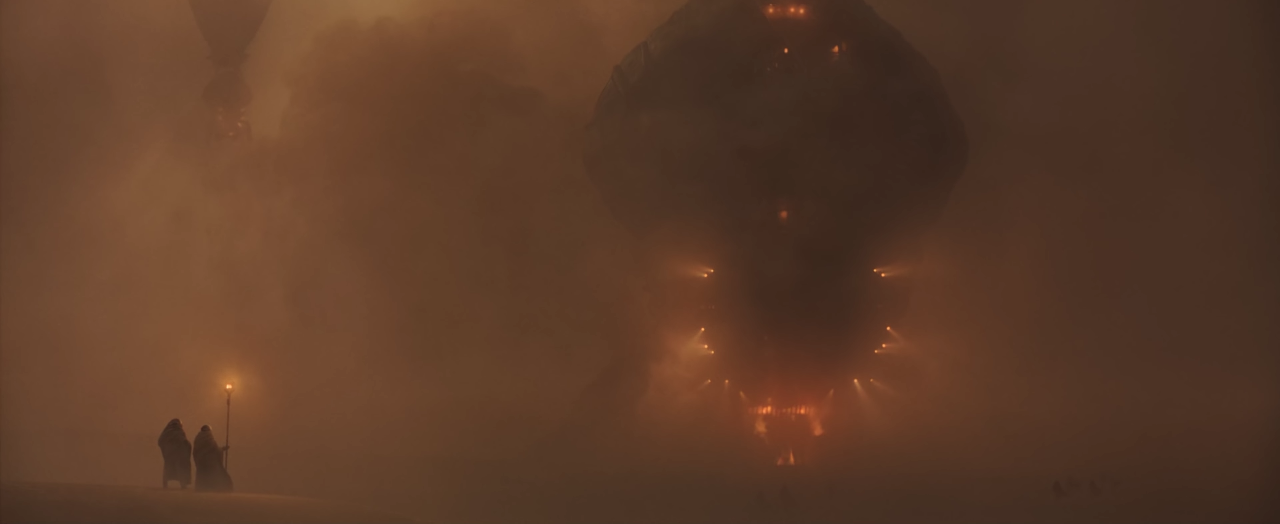
It was with this confused jumble of expectations bouncing around in my head that I apprehensively approached Dune: Part One. Even while watching I found myself trying to shift into the mindset of a newcomer. How would I react to this or that if I didn’t know the story already? Would I comprehend the depth of the intergalactic politics, the intricacies of the desert ecosystem, the importance of spice for commerce and space travel, the religious fervor of the Fremen, the background machinations of the Bene Gesserit, the unbreakable conditioning of the Suk doctors? But then it hit me—the people who are going to ensure that the second, third, fourth film (we can only hope that Villeneuve gets to adapt God Emperor of Dune) get made are the people who regularly shell out the price of movie ticket to go see the latest Marvel movie, the newest Star Wars, the most recent Harry Potter spin-off. That’s the playing field we’ve entered here if Villeneuve wants to continue working with hundreds of millions of dollars and a large cast of prominent movie stars. Interestingly, while trying to capture the same audience, the film rejects the cynical ethos of the corporatized blockbuster franchise with its earnest storytelling, deliberate pacing, wild jargon, and lovingly framed spectacle. But it also avoids treading into mature territory for its own sake—the worst of its violence is implied, harsh language isn’t used, erotic sex scenes are nowhere to be found. In this day an age, such a straight-faced, unironic epic is hard to come by. All that to say, general audiences don’t necessarily need to grasp the depth of each interpersonal conflict, the horror of watching Paul transform from a promising young leader to a charismatic figure who inspires a religious jihad, or the sprawling complexity of Herbert’s intricately designed intergalactic ecosystem. That being the case, even with its rounded corners and smoothed edges and the fact that it’s basically an extended prelude for the second half of the story, Villeneuve’s film is about as good as anyone could reasonably expect, containing sufficient breadcrumbs for the book’s devotees and allusions to spectacular cinematic adventures of old for the film buffs, but otherwise a consummate sci-fi action adventure. That Villeneuve tries to please everyone and mostly succeeds is borderline miraculous, even if that means each camp will have their tiny little axes to grind.

There are a lot of trees here and the more I look at them the less I see the beautiful forest. If we take a step back and contemplate the hallucinogenic storytelling, the masterful atmosphere, the magnificent tactility of the set designs, the sheer scope of the project, what Villeneuve has achieved here is staggering—the ultimate culmination of his career thus far and a wonderfully faithful adaptation that makes the shifting sands of Arrakis come alive. Consider that Villeneuve manages to package a hypnotic mind trip of a story—complete with Paul’s mystical visions of the future that bid us to participate in his meditative journey as he mentally contends with the idea that his messianic role amongst the Fremen may have been manufactured for him by the Bene Gesserit—into a palatable adventure that’s fit for a wide audience. And yet the film doesn’t do all of this with wordy explanations, but with images, whispers, silence, insinuations. It gives us ideas to chew on even as it moves from jaw-dropping spectacle to intimate conflict to an extended sequence of a little desert mouse whose ears have evolved to collect dew and thus sustain him in the desert, each presented with appropriate gravity and woven into the fabric of the whole. Here’s hoping that in a couple years one will be able to schedule a double bill encompassing Villeneuve’s complete vision and can unequivocally refer to it as a masterpiece of blockbuster cinema.
1. No disrespect meant toward John Harrison, whose made-for-television series was probably the best adaptation until Villeneuve’s version.
2. I’d gladly have kept my butt parked in the theater seat for another 2.5 hours to see it through even though I really had to pee.
3. After I wrote this, but before it’s scheduled post date, Legendary/Warner Bros. announced the sequel was officially in the works. Thank you to all who went out to see it opening weekend.